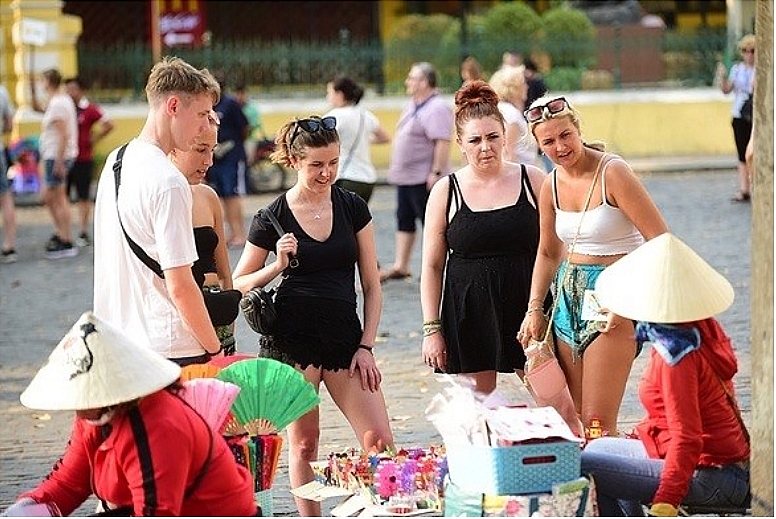Local workers wait for tourism activities to resume
 |
| Illustrative image (Photo: VNA) |
Travel agencies are eager to resume tourism activities and host international tourists, but they need unified procedures on how to safely conduct tourism.
Chairman of HG Group Ngo Minh Duc said that some of his company’s employees who took care of foreign tourists in the past have been transferred to the domestic tourism segment.
“The domestic segment takes up a small portion of the company’s activities since high-end tourism services and international flight routes are popular mostly among international travellers,” Duc said.
Duc said he hoped that some international routes to countries and territories that have efficiently handled the COVID-19 pandemic such as the Republic of Korea and Taiwan will reopen in July. Typical business activities will then officially resume, he added.
Meanwhile, President of VinaCapital Don Lam has proposed a “Safe Tourism” model which could reboot the international tourism market.
Under this model, tourists would be required to test negative for the novel coronavirus before boarding transport for Vietnam. They could only travel to designated, isolated tourism destinations such as Phu Quoc or other villa resorts on islands.
Tourists would be able to participate in outdoor activities such as sunbathing or water sports on Phu Quoc beaches, and have a COVID-19 test done periodically during the holiday. Resort staff would be trained in ways to ensure safety in their area.
Experts agreed that bringing tourists to resorts in Vietnam via charter flights would be a smart move, and that many countries have implemented the scheme.
CEO of Luxury Company Pham Ha said that isolated tourism products would be the only way to bring international travellers back to Vietnam soon.
This form of safe tourism could be embraced by provinces with beaches and islands, Ha said, adding that more initiatives are needed to promote the reopening of the tourism market while ensuring travel safety.
Ha has received positive feedback from international tourists for tours departing in September and October.
According to Director of the Vietnam Tour Guide Operations Centre Tran Thi Viet Huong, the centre has more than 300 tour guides, but only a few of them have returned to work. More than 90 percent of staff are still unemployed and have to make ends meet by doing other jobs.
Airline tickets sold to tourist groups are still selling at a high price and local travellers are hesitant to travel in groups. Organising tours now would end up leading to losses, Huong said.
Meanwhile, the director of a trade and tourism company said that her company had tried to sustain casual business. Even though she experienced the SARS and avian influenza outbreaks and knows about the market recovery process, she admitted that the COVID-19 pandemic was a serious strike.
As people are still concerned about the outbreak, many tourists are only booking accommodations and not specific tours in advance.
“Most travel agencies do not have customers at the moment,” she said.
Hoang, a restaurant manager at a hotel in HCM City’s central District 1, said that after the outbreak, the restaurant welcomed only 40 percent of staff back to work.
COVID-19 has been an “earthquake” for the local cuisine industry, affecting the food and beverage industry in general as well as workers in the field.
“We are recovering slowly,” Hoang said.
“The main guests of the restaurant used to be international tourists and business travellers coming to the city for a short amount of time. These two groups are obviously not ready yet to return. We have decided to wait until September when life should be back to normal and then recruit new staff again,” she added.
What the stars mean:
★ Poor ★ ★ Promising ★★★ Good ★★★★ Very good ★★★★★ Exceptional
 Tag:
Tag:
Related Contents
Latest News
More News
- Visa data highlights five key payment and travel trends in Vietnam for 2026 (January 14, 2026 | 10:42)
- New Year tourism receipts top $40m in key cities (January 06, 2026 | 08:36)
- Vietnamese passport climbs on global ranking (December 16, 2025 | 08:00)
- Manila becomes a new check-in destination for Vietnamese youth (December 11, 2025 | 18:07)
- Vietjet launches mega year-end ticket promotion (December 10, 2025 | 11:33)
- Dalat leads Vietnam’s 2025 search trends (December 09, 2025 | 13:44)
- Vietnam welcomes record wave of international visitors (December 09, 2025 | 13:43)
- Vietjet launches daily Manila flights to celebrate year-end festive peak season (December 05, 2025 | 13:47)
- The destinations powering Vietnam’s festive season travel demand (December 04, 2025 | 18:33)
- Vietnam named among the world’s most exciting winter destinations (December 04, 2025 | 15:10)






















 Mobile Version
Mobile Version